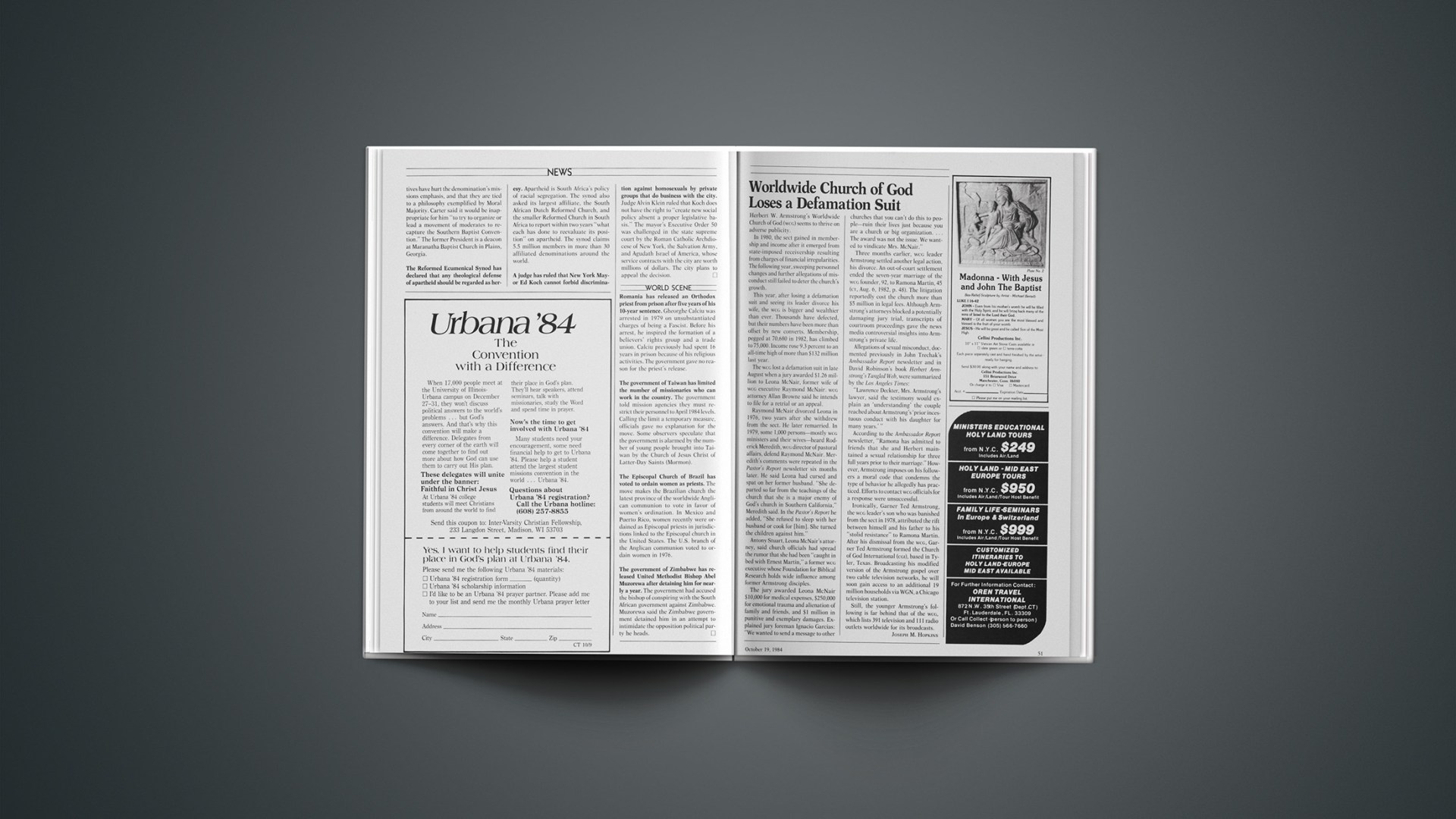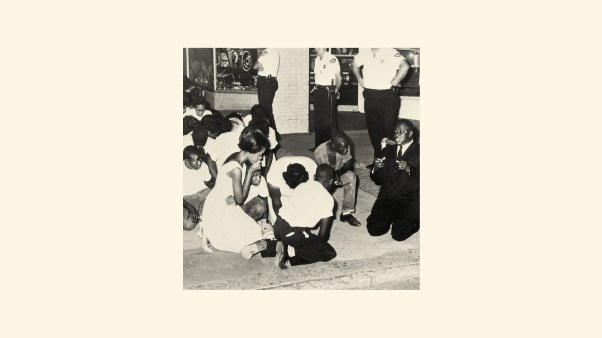Herbert W. Armstrong’s Worldwide Church of God (WCG) seems to thrive on adverse publicity.
In 1980, the sect gained in membership and income after it emerged from state-imposed receivership resulting from charges of financial irregularities. The following year, sweeping personnel changes and further allegations of misconduct still failed to deter the church’s growth.
This year, after losing a defamation suit and seeing its leader divorce his wife, the WCG is bigger and wealthier than ever. Thousands have defected, but their numbers have been more than offset by new converts. Membership, pegged at 70,680 in 1982, has climbed to 75,000. Income rose 9.3 percent to an all-time high of more than $132 million last year.
The WCG lost a defamation suit in late August when a jury awarded $1.26 million to Leona McNair, former wife of WCG executive Raymond McNair, WCG attorney Allan Browne said he intends to file for a retrial or an appeal.
Raymond McNair divorced Leona in 1976, two years after she withdrew from the sect. He later remarried. In 1979, some 1,000 persons—mostly WCG ministers and their wives—heard Roderick Meredith, WCG director of pastoral affairs, defend Raymond McNair. Meredith’s comments were repeated in the Pastor’s Report newsletter six months later. He said Leona had cursed and spat on her former husband. “She departed so far from the teachings of the church that she is a major enemy of God’s church in Southern California,” Meredith said. In the Pastor’s Report he added, “She refused to sleep with her husband or cook for [him]. She turned the children against him.”
Antony Stuart, Leona McNair’s attorney, said church officials had spread the rumor that she had been “caught in bed with Ernest Martin,” a former WCG executive whose Foundation for Biblical Research holds wide influence among former Armstrong disciples.
The jury awarded Leona McNair $10,000 for medical expenses, $250,000 for emotional trauma and alienation of family and friends, and $1 million in punitive and exemplary damages. Explained jury foreman Ignacio Garcias: “We wanted to send a message to other churches that you can’t do this to people—ruin their lives just because you are a church or big organization.… The award was not the issue. We wanted to vindicate Mrs. McNair.”
Three months earlier, WCG leader Armstrong settled another legal action, his divorce. An out-of-court settlement ended the seven-year marriage of the WCG founder, 92, to Ramona Martin, 45 (CT, Aug. 6, 1982, p. 48). The litigation reportedly cost the church more than $5 million in legal fees. Although Armstrong’s attorneys blocked a potentially damaging jury trial, transcripts of courtroom proceedings gave the news media controversial insights into Armstrong’s private life.
Allegations of sexual misconduct, docmented previously in John Trechak’s Ambassador Report newsletter and in David Robinson’s book Herbert Armstrong’s Tangled Web, were summarized by the Los Angeles Times:
“Lawrence Deckter, Mrs. Armstrong’s lawyer, said the testimony would explain an ‘understanding’ the couple reached about Armstrong’s ‘prior incestuous conduct with his daughter for many years.’ ”
According to the Ambassador Report newsletter, “Ramona has admitted to friends that she and Herbert maintained a sexual relationship for three full years prior to their marriage.” However, Armstrong imposes on his followers a moral code that condemns the type of behavior he allegedly has practiced. Efforts to contact WCG officials for a response were unsuccessful.
Ironically, Garner Ted Armstrong, the WCG leader’s son who was banished from the sect in 1978, attributed the rift between himself and his father to his “stolid resistance” to Ramona Martin. After his dismissal from the WCG, Garner Ted Armstrong formed the Church of God International (CGI), based in Tyler, Texas. Broadcasting his modified version of the Armstrong gospel over two cable television networks, he will soon gain access to an additional 19 million households via WGN, a Chicago television station.
Still, the younger Armstrong’s following is far behind that of the WCG, which lists 391 television and 111 radio outlets worldwide for its broadcasts.
A Diverse Group Hammers Out Guidelines For Implementing The Equal Access Act
While “equal access” legislation was debated in Congress, evangelicals who favored the bill and civil libertarians who opposed it had little to say to one another. Once it became law, however, a surprisingly diverse group convened under the leadership of attorney John Baker of the Baptist Joint Committee on Public Affairs, and developed guidelines explaining what the Equal Access Act means for public school officials.
The law guarantees the right of high school students to meet for prayer and Bible study—or any other sort of discussion—when other extracurricular clubs are allowed to meet. This right has been challenged in courts across the country and is likely to be considered by the U.S. Supreme Court in its current term.
The bill generated widespread support among Christian organizations but raised fears among Jewish groups and secular civil liberties groups. Its opponents believed it would open public schools to religious cults, proselytizing, and polarization among students of differing religious beliefs.
The compromise version of the bill that passed both houses of Congress in August (CT, Sept. 7, 1984, p. 77) provides safeguards against potential abuses. The guidelines drawn up by Baker’s committee explain those safeguards in detail.
The committee included Forest Montgomery of the National Association of Evangelicals, and Samuel Ericsson of the Christian Legal Society, two staunch supporters of the bill. In addition, the bill’s most vocal opponents attended the drafting sessions. Included among the opponents were representatives of the American Civil Liberties Union, Americans for Democratic Action (ADA), and the National Education Association (NEA). Joel Packer, NEA legislative specialist, said the guidelines will appear in a monthly newsletter distributed to his organization’s 1.7 million members, most of whom are public school teachers.
The guidelines explain that Congress intended to strike a balance between the Constitution’s prohibition against state-sponsored religion and its guarantee of the right to practice religion. The Equal Access Act leaves intact earlier court decisions that outlawed organized classroom prayer, but it protects voluntary, student-initiated and student-run religious meetings. In addition, it preserves the school’s authority to exercise control over extracurricular activities.
“Our unanimity gives school principals some degree of assurance about what they can and cannot do,” Baker said. Members of his committee developed an unexpected sense of camaraderie as well as seven pages of guidelines. Mitchell Edelstein, of ADA, said he was “very pleased—even surprised—at how well it came off. It definitely was a strange-bedfellows situation.” Packer, of the NEA, said his group will monitor how religious clubs operate under the auspices of the Equal Access Act. If abuses are spotted, further court battles are a possibility.
San Diego Okays Plans For Campus Crusade University
In a 5-to-4 vote, the San Diego city council last month approved plans for a 5,000-acre development managed by Campus Crusade for Christ. Called La Jolla Valley, the development will include the 1,000-acre campus of the International Christian Graduate University (ICGU), a 750-acre high-technology industrial park, and several thousand acres of residential housing (CT, Feb. 3, 1984, p. 66).
The project faced heavy local opposition and had twice been recommended for rejection by city planners. Mayor Roger Hedgecock had charged that the development violated the city’s growth management plan. To make the project more palatable to opponents, planners deferred the residential section of the development until 1995. Campus Crusade president and founder William Bright plans to structure the residential and industrial development to “perpetually endow” the university. Plans for ICGU include schools of law, business, education, and communication.
During the last five years, Campus Crusade spent more than $1 million for engineering tests, land-use attorneys, and public relations firms to justify and promote the project.
The La Jolla Valley area lies between two affluent San Diego suburbs. Campus Crusade purchased the land in 1979 for approximately $25 million, and subsequently bought out the interest of Signal Landmark Corporation, a developer and early partner in the venture.
ICGU provost Ed Pauley, fomerly of Biola University, said construction probably won’t begin until 1986. Currently, ICGU is a school of theology at Campus Crusade headquarters in Arrowhead Springs, California, with satellite campuses in Kenya and the Philippines. The school is used primarily to train Campus Crusade staff members.
A Lutheran Missionary Will Head Lausanne Committee
Carl J. Johansson, a Lutheran Church in America pastor and missionary, has been named executive director of the Lausanne Committee for World Evangelization (LCWE).
Meeting in Stuttgart, West Germany, the LCWE appointed Johansson to succeed Gottfried Osei-Mensah, a Ghanian-born Baptist pastor who has held the post for nine years. Johansson, who has spent 35 years as a pastor in the United States and as a missionary in East Africa and Nepal, will set up an office in the United States. Support offices are planned for cities in other countries.
The 75 LCWE participants from 39 countries voted to hold a second International Congress for World Evangelization in 1989, probably in a Third World city. The committee will encourage the formation of regional and national conferences to provide input for the 1989 meeting.
LCWE grew out of the 1974 International Congress for World Evangelization held in Lausanne, Switzerland. The committee was formed by Christians from more than 150 nations.
Correction
CHRISTIANITY TODAY credited the wrong photographer for photos published on pages 56 and 57 of its September 21 issue. Frank Fenlon should have been credited.










